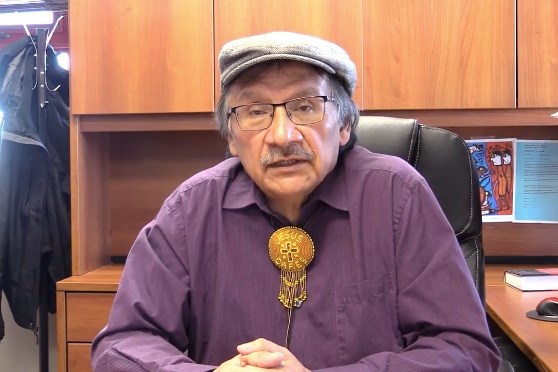Moose Cree First Nation has taken proactive measures to keep COVID-19 away from its community members.
Chief Mervin Cheechoo said he understands it’s a tough situation for many people and asked for their patience.
“Our people are social people, they like being together, so this is a real challenge for all of us,” he said.
“We are all in this together. We are all called to make sacrifices. Let’s keep each other safe, our elders, our children. Let’s keep the most vulnerable safe.”
Indigenous communities are more susceptible and vulnerable to the pandemic due to a lack of infrastructure, overcrowding and housing shortage, Cheechoo said, adding that there’s also a high rate of diabetes, high blood pressure and cancer.
If the pandemic hits those communities, it’ll be difficult to keep infected people isolated, he explained.
“We just won’t handle the outbreak, we don’t have the capacity to handle (it) here,” he said.
To date, there have been no cases of COVID-19 in the Moose Cree First Nation. A few people in the community have been tested out of precaution but the tests came back negative, Cheechoo said.
If people think they have symptoms, they can contact the Moose Factory Health Centre or WAHA. The paramedics can also do swabbing test right at the person’s doorstep, the chief said.
The Moose Cree has taken several measures to ensure public safety such as limiting the number of people in local stores, placing markings on the floors to help people keep their distance and encouraging community members to wear masks.
All non-essential travel between Moose Factory and Moosonee has been put on hold effective May 5 until further notice.
Community members have been supportive following the precautionary measures and Cheechoo thanked frontline workers, grocery store employees, firefighters and all essential workers for their hard work and taking care of community residents.
In discussions with the Expedition Helicopters, it was decided there will be no daily skeds or charters for the general public during the spring breakup, according to the Facebook announcement.
The exemptions include travel to and from spring camps in the James Bay region, travel of essential workers, and family emergencies relating to medical, palliative and funerals which will be dealt with on a case-by-case basis.
There’s also one plane for COVID-related travel that has been used about 15 or 20 times by people needing to go to urgent appointments or by essential workers, Cheechoo said. Out of nine seats on the plane, four seats have been taken out to allow physical distancing.
April 16, Moose Cree council passed a bylaw implementing emergency physical distancing measures. The bylaw is currently effective for 30 days.
According to the bylaw, Moose Factory Island residents must stay home except to go to work, get groceries, exercise or obtain medical supplies. A two-metre distance should be maintained between people from different households and anyone with symptoms should isolate themselves inside their residence.
No gatherings of more than five people from different households are allowed except for funerals which can be attended by up to 10 people.
As a former minister, Cheechoo did one of the funerals where chairs were set up two metres apart. In addition to a few people present at the ceremony, the funeral was also live-streamed to people who watched it from home.
Anyone violating the bylaw may be fined up to $1,000, face imprisonment for up to 30 days or be subject to both a fine and imprisonment.
The bylaw will be enforced by the Nishnawbe-Aski Police Service.
“Normally, we wouldn’t do this but these are unprecedented times. We’ve never had this before, it’s new for everything,” Cheechoo said in an interview. “We’re just telling people to hang in there together and keep the COVID out.”
The Polar Bear Express service, which provided over 51,000 passenger trips between Cochrane and Moosonee in the past year, has also been suspended until May 21.
The decision was made in consultation with representatives from the Weeneebayko Area Health Authority (WAHA), Town of Moosonee, MooCreebec Eeyoud Council, Taykwa Tagamou First Nation, Ontario Northland, Moose Cree First Nation and Mushkegowuk Council.
The decision on whether the service suspension should be extended will be reconsidered on May 13.
The freight service carrying essential supplies such as food, fuel, building materials, equipment and medical supplies continues twice a week.
Additional precaution measures include the Weeneebayko General Hospital setting up a COVID-dedicated wing with isolation rooms. The Assisted Living Building, which has 16 rooms, was turned into an assessment centre and is ready to be used should the hospital be overwhelmed with the flow of patients, Cheechoo said.
More ventilators and personal protective equipment are supposed to arrive this week, and the Moose Cree also put in some finances to help more people to go out to their hunting camps where it is safer to be away from the pandemic, Cheechoo said.
The Moose Factory Emergency Management also conducts daily surveillance flights to monitor ice breakups on a number of rivers. The updates can be found on the Town of Moosonee's Facebook page.
Cheechoo said the water level in Moose River isn’t high and the risk of flooding is low at this point.
Out of six alerting levels, the community is at Level 2, an advisory alert level, when the spring breakups have begun and surveillance flights are underway as residents are asked to stay away from the river banks.
There’s been some flooding in the past but not to the point of needing a full evacuation, he said.
“I think we’re going to be fairly safe.”
